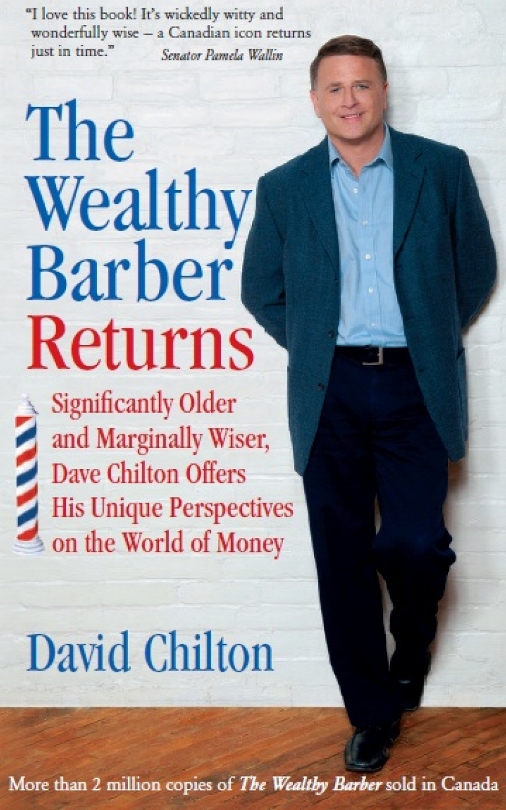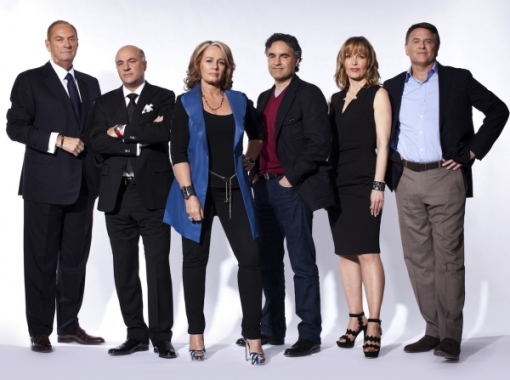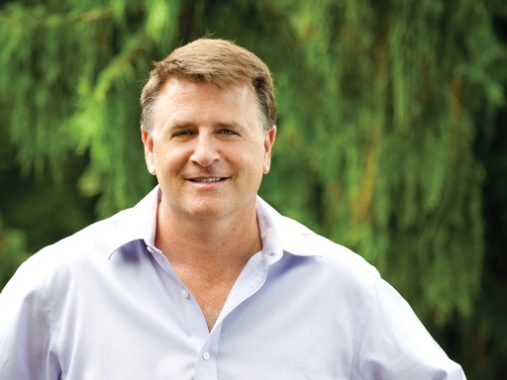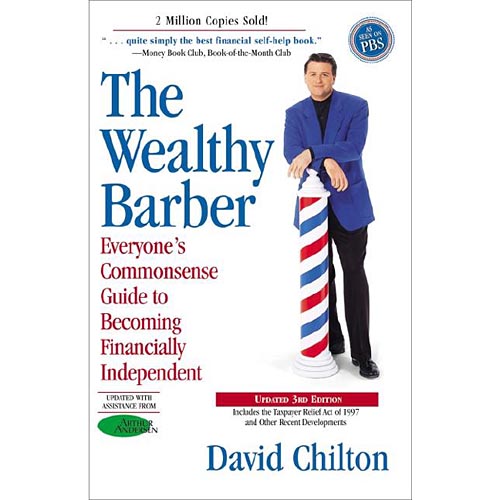Posted By Alma Sandoval Betancourth on Oct 17, 2013 |
Those of you who assiduously watch the popular CBC show Dragon’s Den may have noticed that there is a new dragon this year: Kitchener’s David Chilton, author of the popular Wealthy Barber book, a no-nonsense financial planning book that although written almost 25 years ago, it should be required reading for every Canadian because some of its teachings still resonate with those interested in improving their financial outlook today. Thankfully, Chilton wrote a sequel of sorts, The Wealthy Barber Returns, in 2011, and although it no longer features the Wealthy (and very financially savvy) Barber, it’s still a great read, clear, concise and very straight to the point– and yes, somewhat funny… well, as funny as a book about finances can possibly be.
Lea la Versión en Español al Pie de la Página.
It would be impossible to summarize in one short note everything that the book teaches about finances, but some of the points that personally struck a chord had to do with how consumed with consumption most of us are, the negative effect this has in our overall health and well-being, the very human desire to crave a high status amongst our peers and the very human need to compete and of wanting to “Keep up with the Joneses”.
Every chapter in the book is very short, and with light humour Chilton lets the readers know some painful truths, one of the biggest being our obsession with accumulating material possessions. “We want with such emotional intensity that we’re able to convince ourselves that our desires aren’t ‘Wants’ at all, but instead integral components of our future happiness,” writes Chilton. “In reality, all our stuff weighs us down. And our pursuit of ‘More’ often distracts us from what’s truly important in life. I genuinely believe that our never-ending material quest is not only sabotaging our financial tomorrows, but also negatively impacting our psychological todays. As Bertrand Russell once noted, ‘It is our preoccupation with possessions, more than anything else, that prevents us from living freely and nobly.'”
Most of us spend most if not all (or more!) of our after-tax income in material possessions that depreciate in value as soon as they leave the stores. Saving, on the contrary, is not something most of us do. The one lesson the first book tried to instil in readers was the idea of “Pay Yourself First”, or save 10 to 15% of your monthly salary and try to live on the rest. Says Chilton, “One of the most damaging misconceptions in personal finance is that saving for the future requires sacrifices today that lessen people’s enjoyment of life. Surprisingly, it’s quite the opposite! People who live within their means tend to be happier and less stressed. That’s true not only for the obvious reason (they know their financial futures look bright) but also because they’re not consumed with consumption: they’re not in the emotionally and financially draining race to acquire the most stuff they possibly can.”

In the chapter Status Update he talks about how a lot of us buy into the fact that we think buying expensive stuff, even if we can’t afford it, will give us a higher status amongst our peers, while it’s very likely that a lot of them are on the same boat. “Most of us crave status,” he says. “Almost all of us care greatly about what others think of us. Psychologists have long lamented this situation and remind us how potentially unhealthy it is to have our self-esteem so directly determined by the perception of others. Few things in life are more valuable than our self-esteem, yet we often willingly surrender it to the opinions of others. Then we spend a king’s ransom trying to get it back.”
The reality is, however, that buying more doesn’t necessarily give us the happiness that most of us desire, because things lose their value, monetary and sentimental, very quickly. “Our possessions yield less pleasure each time we use them.” Look around your closet. If you’re a shopaholic, how much of the stuff you own do you actually wear? And out of that, whether it’s the expensive, brand name items or maybe something you didn’t pay an arm and a leg for, what do you feel most comfortable in? A few months ago I wrote Facebook a status update (then it must be true!) about this very subject: my 5 or 6 most valued possessions actually have a cumulative value of 20 bucks at the most. Well, in reality, their economic value is probably closer to zero, as the things I call my most prized possessions are old, worn out and of value only to me. But I love them and would really miss them if I didn’t have them: a pair of old shorts I bought in Cuba when our luggage didn’t arrive, a blender we got as a wedding gift, my now old backyard lounger and my blue London hat– of no value to anyone else (they’re not even brand items), but they bring me a lot of happiness and joy. Now, that’s value. Well, to me.
Chilton also touches very early on in the book about our very human obsession of “Keeping up with the Joneses.” He advises how important it is to keep things in perspective: He emphasizes how lucky we are to live in a country like Canada: “We won the country-of-residence lottery,” he says. “A prosperous, democratic, peaceful and beautiful nation. We obsess so much about what we don’t have that it affects our ability to enjoy what we do have.” We are not only lucky to have what we have compared to the rest of the world, but we also must realize that we are lucky to live in this day and age, with all the technological advances and access to everything the world has to offer (foods from all over the world, for instance), modern cars, consumer electronics and such. “The average Canadian lives a much better life than did the kings and queens of wealthy empires just decades– not centuries– ago. Harold Coffin, the late Associated Press columnist noted, ‘Envy is the art of counting the other fellow’s blessings instead of your own.’ Most of the people I’ve known who are adept at living within their means don’t make that mistake. They have perspective and fully grasp how lucky they are to be right here, right now. From that knowledge flows gratitude.”
Living within our means: now there is a concept the great majority of us struggle with day in and day out. Luckily there are books like The Wealthy Barber and The Wealthy Barber Returns to gear us in the right direction, but it takes a lot of discipline and almost superhuman restraint to not give into temptation. The rest of the book has a lot of very valuable information and insight for those who want to plan for the future in a responsible and judicious manner.

________________________
David Chilton: The Wealthy Barber Returns
Para aquellos de ustedes que miran el programa televisivo en el canal CBC, Dragon’s Den, habrán notado el nuevo “Dragón” este año: David Chilton, quien reside en Kitchener y es autor del popular libro de planeamiento financiero The Wealthy Barber (El Barbero Adinerado). Este libro que fue escrito hace ya casi 25 años debería ser lectura obligatoria para la mayoría de los Canadienses. Algunas de sus enseñanzas resuenan todavía hoy entre aquellos que desean mejorar su pronóstico financiero en la actualidad. Por suerte Chilton decidió escribir una versión más al día de su exitoso libro, The Wealthy Barber Returns (El Regreso del Barbero Adinerado) en el 2011 y aunque la historia ya no se basa en la perspectiva del perspicaz barbero, es igualmente un libro con material muy interesante, claro, conciso y que va directamente al punto– y es tambien algo divertido ó tan divertido como lo puede ser un libro sobre finanzas.
Sería imposible hacer un resúmen de todas las enseñanzas del libro sobre finanzas personales, pero algunos de los puntos que tocaron un punto sensible fueron el como muchos de nosotros nos obsesionamos con el consumo, el efecto negativo que esto tiene en nuestra salud y bienestar, el deseo tan humano de obtener una posición social que va más alla de nuestros medios y la competencia que se crea tratando de mantener una posición la cual no alcanzamos a mantener.
Cada capítulo en el libro es corto, y con ligero humor, Chilton hace tragar a los lectores verdades que pueden ser muy difíciles de digerir, y una de las más grandes es la humana obsesión de acumular bienes materiales. “Deseamos las cosas con tanta intensidad emocional que logramos convencernos a nosotros mismos que nuestros deseos no son eso, deseos, sino componentes integrales de nuestra felicidad futura,” escribe Chilton. “La realidad es que todas esas posesiones materiales nos hunden. Y el perseguir “Más” a menudo nos distrae de lo que es realmente importante en la vida. Genuinamente creo que nuestra búsqueda interminable de cosas materiales no solamente sabotea nuestro futuro financiero, sino que impacta negativamente nuestro estado psicológico actual. Como notó Bertrand Russell, ‘Es nuestra preocupación con cosas materiales, más que nada, lo que nos previene de vivir noble y libremente.'”

La gran mayoría de nosotros gastamos todo (o más!) nuestro salario en cosas materiales que pierden valor asi salen de las tiendas. El ahorro, por lo contrario, no es algo que la mayoría de nosotros implementa. La lección más grande que el primer libro trató de inculcar en los lectores fue la idea de “Páguese a Usted Mismo Primero) ahorrando 10% a 15% del salario mensual, y tratar de vivir con el resto. “Una de las ideas equivocadas más dañinas en las finanzas personales es que ahorrar requiere sacrificios hoy que truncan el poder gozar de la vida a plenitud. Para sorpresa de todos, es en verdad lo opuesto! Las personan que viven en la medidad de sus posibilidades tienden a ser más felices y menos estresadas que el resto. Eso es cierto no solo por razones obvias (saben que su pronóstico financiero es brillante) pero tambien porque no se dejan consumir por el consumo; no toman parte del desagüe emocional y financiero que es la carrera por obtener la mayor cantidad de posesiones que estén a su alcance.”
En el capítulo Status Update (Actualización del Estado) habla sobre como muchos de nosotros nos hacemos la idea que al comprar cosas caras, aún si están fuera de nuestro alcance y no las podemos pagar, hará que logremos una posición social más alta entre nuestros conocidos; mientras tanto es muy posible que ellos estén tambien en la misma encrucijada. “La mayoría de nosotros deseamos tener una posición social más alta,” nos dice. “A todos nos importa mucho lo que los otros pienses sobre nosotros. Los psicólogos lamentan estan situación y nos recuerdan cuán potencialemente dañino es nivelar nuestra auto-estima directamente determinada por la percepción que otros tengan de nosotros. Hay pocas cosas tan valiosas como nuestra auto-estima, y sin embargo se la cedemos sin miramientos a la opinión que otros tengan de nosotros. Y al final gastamos una fortuna tratando de recuperarla.”
La triste realidad es que el comprar cosas materiales no necesariamente nos brinda la felicidad que buscamos porque lo material pierde valor, monetario y sentimental, rápidamente. “Nuestras posesiones proveen cada vez menos placer cada vez que las usamos.” Si miran su closet y eres de esas personas que compran de todo, cuantas de las piezas que haz comprado usas con frecuencia? Y de lo que tienes, ya sea las cosad de marca ó talvez algo por lo que no pagaste mucho, en cual te sientes más cómoda. Hace unos meses escribí un Facebook Update (asi que debe ser cierto 😉 sobre esto: mis 5 o 6 posesiones de más valor son cosas que tienen un valor de no más de $20. O probablemente no valen realmente nada, ya que estás viejas, muy usadas y su valor es alto solamente para mi. Pero son muy valiosas para mi y las extrañaría muchísimo si no las tuviera: mis shorts que compré en Cuba cuando mis maletas no llegaron, mi licuadora que recibimos de regalo en nuestra boda, mi vieja silla playera y mi sombrerito que compré en Londres– cosas que no tienen valor alguno para nadie más pero me traen mucha felicidad y deleite– algo que de verdad si tiene valor. Bueno, al menos para mi.
Chilton tambien menciona en la primera parte del libro nuestra muy humana obsesión de tratar de tener lo que tiene el vecino. Aconseja sobre la importancia de mantener las cosas en perspectiva y enfatiza la suerte que tenemos de vivir en un país como Canadá. “Ganamos la lotería del país de residencia,” dice. “Una nación próspera, democrática, pacífica y bella. Nos obsesionamos tanto con lo que no tenemos y esto afecta nuestra habilidad de disfrutar lo que tenemos.” Tenemos la suerte de tener lo que tenemos en comparación al resto del mundo, pero tambien debemos considerar la suerte de vivir en el tiempo que vivimos, con todos los avances tecnológicos y el acceso a todo lo que el mundo tiene para ofrecer (comidas de todas partes del mundo, por ejemplo). “El Canadiense promedio vive una vida mejor que la que vivieron los reyes y reinas de los ricos imperios hace solo no siglos sino unas cuantas décadas. Harold Coffin, el columnista de la Associated Press, decía que ‘La Envidia es el arte de contar las bendiciones del prójimo en vez de las propias.’ La mayoría de gente que conozco que son expertos en vivir de acuerdo a sus posibilidades no cometen ese error. Tienen la perspectiva correcta y entienden perfectamente la suerte de vivir aqui y ahora. De esta realización fluye el agradecimiento.”
Vivir de acuerdo a las medidas de nuestras posibilidades: he aqui un concepto con el que la gran mayoría de nosotros batalla día a día. Por suerte hay libros como el Wealthy Barber que nos guíen en la dirección apropiada, pero toma mucha disciplina y control casi superhumano para evitar las tentaciones. El resto del libro está lleno de información muy valiosa para aquellos que quieren empezar a planear para el futuro de forma responsable y juiciosa.













